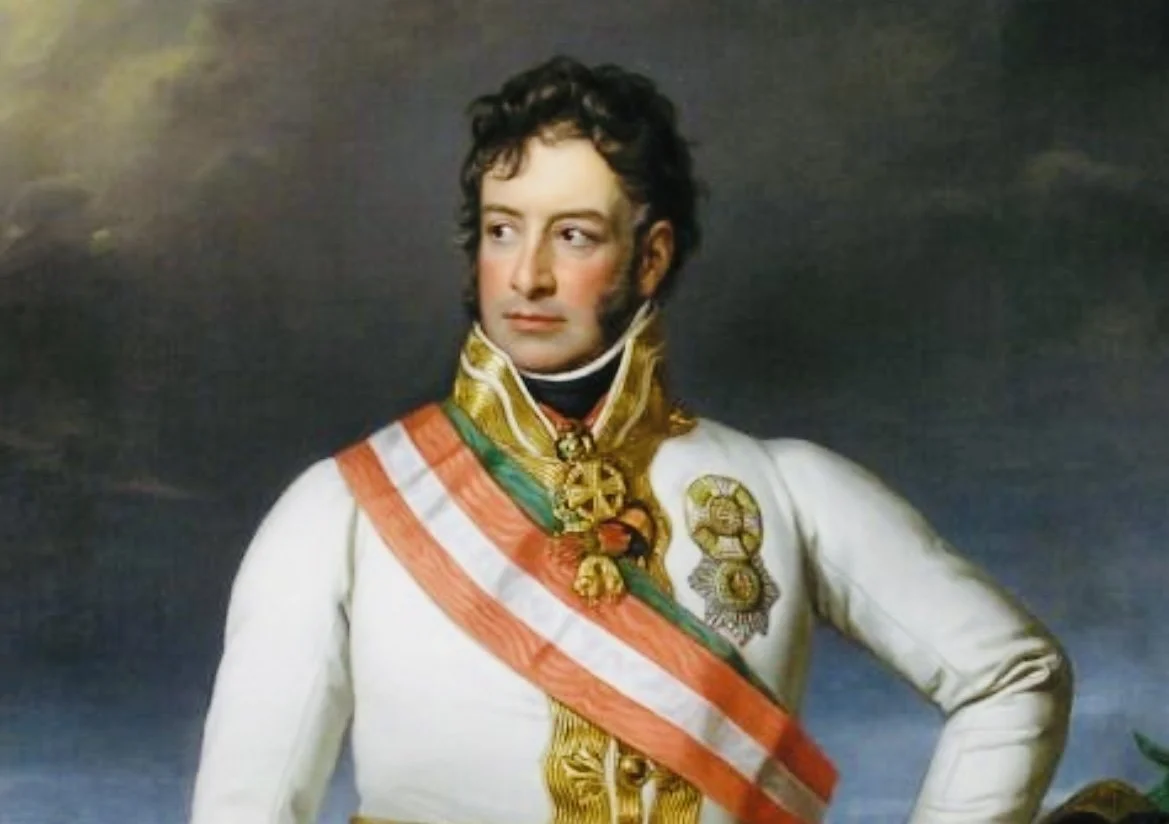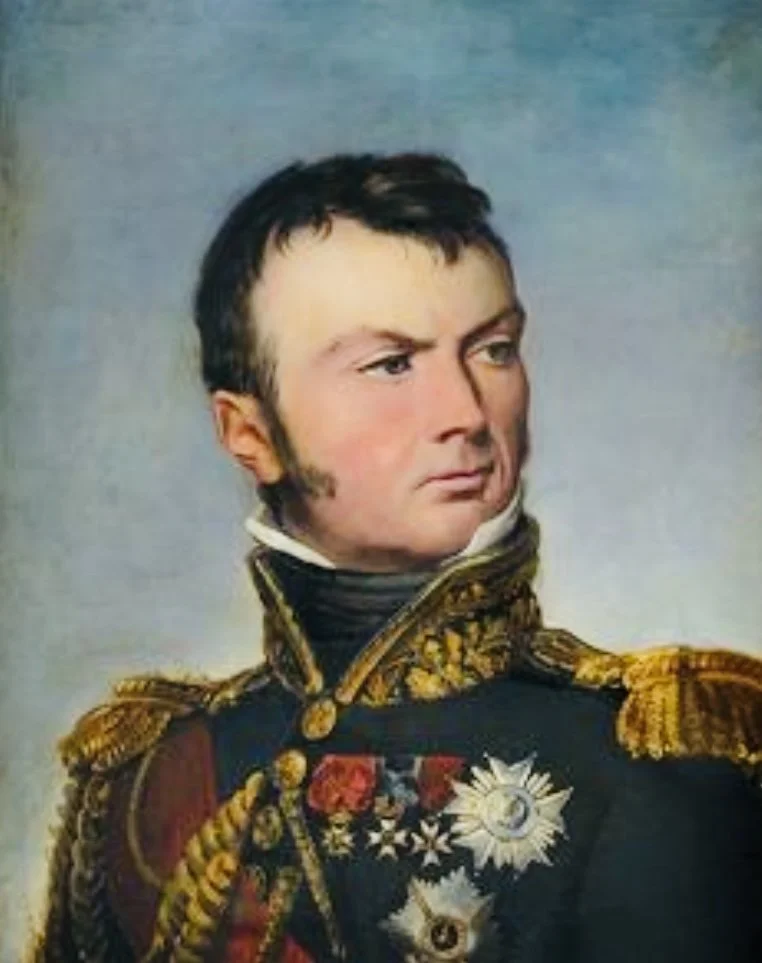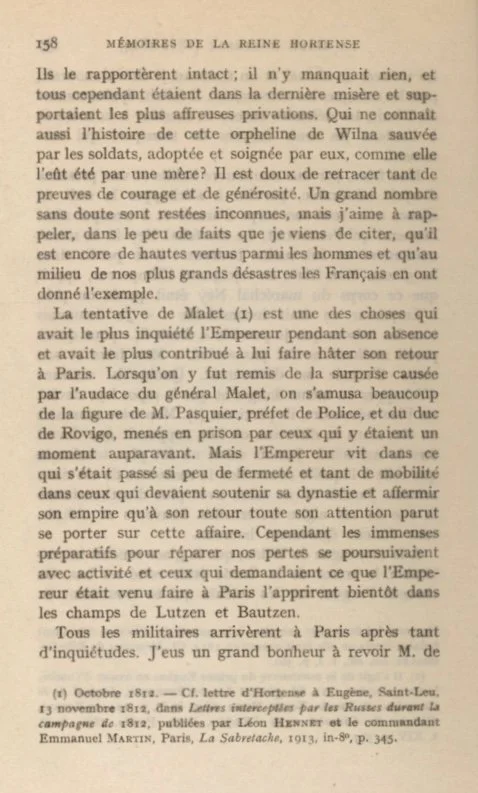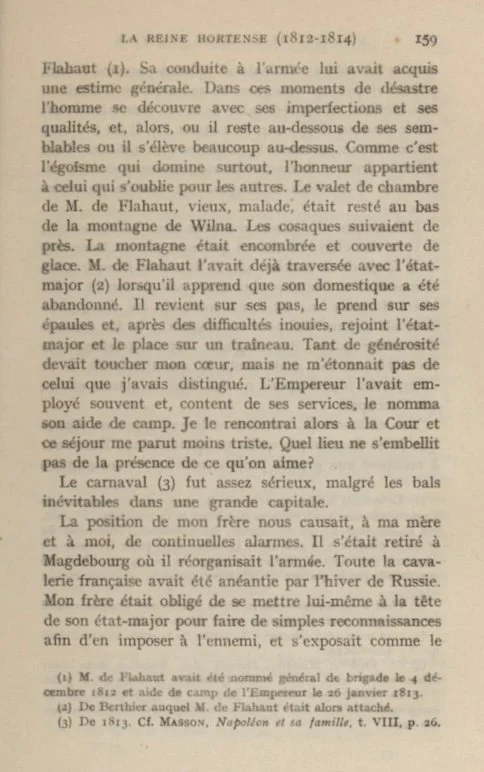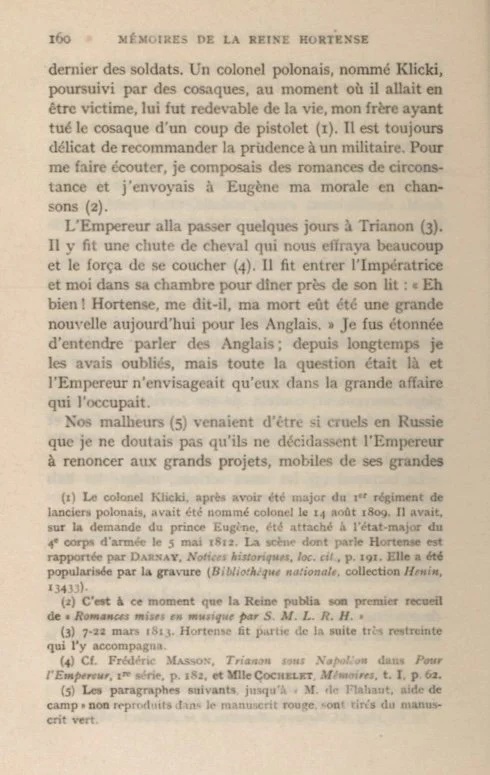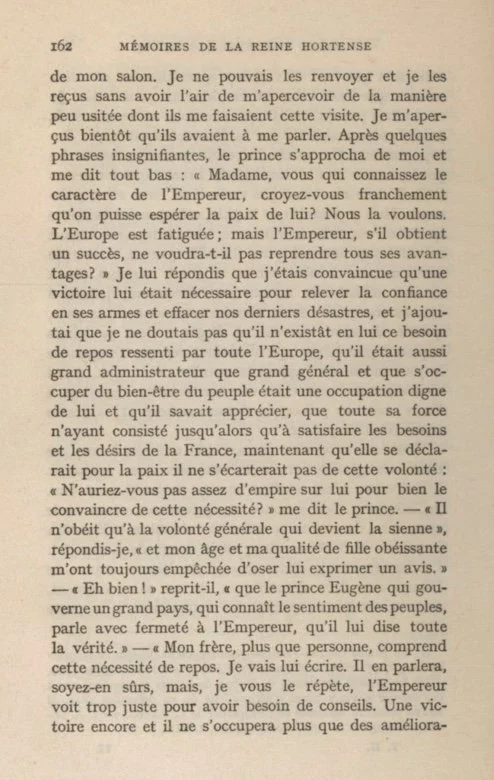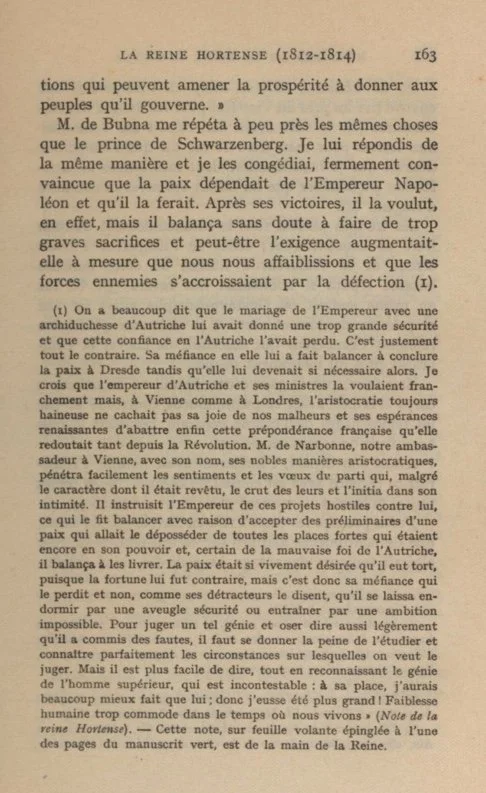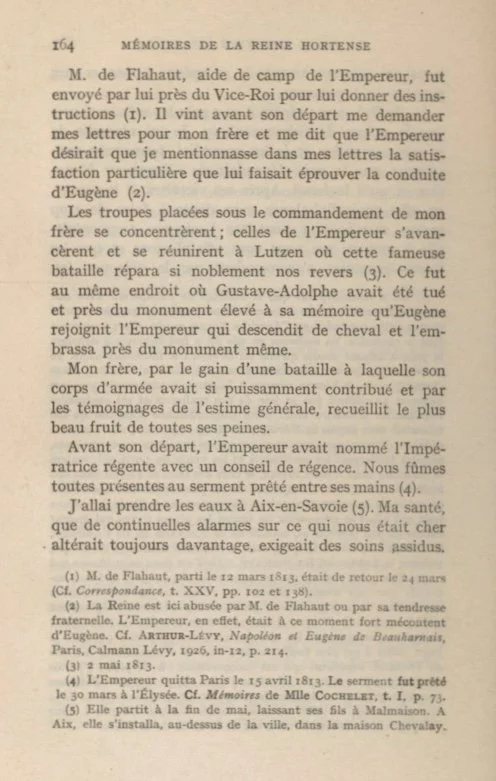Let’s have another look at Hortense’s Memoirs. If you want to read the book it is available for free at the side bar in English and French. Use the widget on the sidebar to translate the text below into pretty much any language.
Hortense was put in an awkward position, where she either would pressure Napoleon at the behest of Prince Schwarzenberg and Comte de Bubna or be “against peace”. The Austrian government is a main force pushing for war throughout this entire story.
It is telling that Napoleon’s enemies, the one’s really running Austria, saw Hortense as a great way to pull Napoleon’s strings.
Hortense’s memoirs continues:
Malet’s conspiracy was one of the things which had most alarmed the Emperor during his absence and had the most to do in deciding his return to Paris. After people had recovered from the shock of Malet's rash enterprise they were much amused at the way Monsieur Pasquier, prefect of police, and the Duc de Rovigo had looked when they were dragged off to prison by men who a few hours previously had themselves been behind the bars. But the Emperor felt that those who should have protected his dynasty had shown a contemptible spirit of vacillation and lack of decision in this affair.
He was greatly concerned about it. Meanwhile enormous plans were under way to make good our losses, and those who had wondered why the Emperor had returned to Paris soon learned the reason on the battlefields of Lutzen and Bautzen.
As all the officers reappeared in Paris after the vicissitudes, they had undergone I had the great joy of seeing Monsieur de Flahaut again. His behavior while in active service had been warmly admired by everyone. In such times of general calamity, a man shows his true colors, displays his qualities and weaknesses and proves that he is of either less or greatly more than average value.
Since egoism is our strongest trait the man who sacrifices himself on behalf of others deserves to be honored. Monsieur de Flahaut's man servant, who was old and feeble, had remained behind at the attack on the mountain of Vilna. The Cossacks were close at hand. The mountain was crowded with men and slippery with ice. Monsieur de Flahaut had already crossed it once with the rest of the Emperor's staff when he heard that his servant was in danger of being left behind. He returned over the ground he had just crossed, lifted him on his shoulders and with great difficulty managed to rejoin and place the valet in a sleigh.
Such a spirit of self-sacrifice touched my heart but did not surprise me on the part of the man who had won my affections.
The Emperor had frequently sent Monsieur de Flahaut on special missions and being satisfied with the way in which he performed them appointed him his aide-de-camp. I often met him at court and therefore found it less gloomy there than it would otherwise have seemed. Is there any place which the presence of the person we love does not make more attractive?
The carnival season that year was not very animated in spite of the balls held as usual in every great capital. My brother's position was a constant source of anxiety to my mother and myself. He had retired to Magdeburg, where he was reorganizing his troops.
The entire French cavalry had been practically wiped out in the Russian campaign. My brother was obliged to place himself at the head of his staff to make even the simplest reconnaissance and he exposed himself as though he were an ordinary private.
A Polish colonel named Klicki, when pursued by the Cossacks, owed his life to my brother's presence of mind, Eugene having shot down the nearest of the Colonel's pursuers just as the Cossack was about to fall upon him.
It always requires tact to advise a soldier to be careful. To make Eugene give attention to what I had to say I wrote appropriate verses and sent him good advice set to music.
The Emperor went to the Trianon for a few days. While there he had a fall from his horse, which alarmed us greatly and obliged him to remain in bed. He sent for the Empress and me to have dinner at his bedside and said to me, "Well, well, Hortense, what a great piece of news it would have been for the English if I had been killed!"
I was surprised to hear him speak of the English. I had forgotten all about them, but they were the most serious problem of all, and the Emperor had them constantly in mind while making his important plans.
Our losses had been so great in Russia that I was convinced they would cause the Emperor to relinquish his vast undertakings, which formed the real reason for his campaigns and to whose success so many victories had already contributed. I felt sure that he would make concessions in order to obtain a much-needed peace, a peace which was as necessary to France as it was to the rest of Europe.
Perhaps one more victory was still required to convince the enemy that the Russian reverses had not crushed either his force or his genius, but I thought that a peace-treaty, even though it were less brilliant than he could have made before that unfortunate campaign, would immediately follow his next military success.
Naturally observant and having always been interested in trying to discover in advance what the Emperor would do, I was so sure that one more combat would put an end to the hostilities that I definitely ordered the furniture of a room which I had been wanting for a long time, after receiving news of the battle of Lutzen.
Hence, I was entirely sincere in the sentiments I expressed during a conversation I had with the Prince of Schwarzenberg [the Austrian Ambassador] following the return of the Emperor. We never received the foreign ambassadors except at our large receptions and in a formal manner.
The Emperor would not have allowed any intimacy with them. Consequently, I was much surprised when one evening while I was at home with only my ladies in waiting in attendance, my valet-de-chambre announced the Prince of Schwarzenberg and Comte de Bubna. De Bubna had just arrived from Vienna, having received a post at the French court.
Our servants had by accident allowed the visitors to come upstairs, and they were waiting for me in my drawing-room. I could not refuse to see them and greeted them as though I was not aware of the unexpected nature of their visit. I quickly noticed that they had something important to say to me privately.
After a few banal remarks the Prince approached me and said in a low voice: "Madame, you who are so familiar with the Emperor's character, do you really think we can expect him to make peace?
“We wish he would do so. Europe is weary. But the Emperor, if he wins a victory, will he not seek to regain all his former advantages?"
I replied that I was convinced that the Emperor must score a success in order to restore the confidence of his troops and wipe out the memory of our recent disasters, and I added that I felt sure the Emperor also realized how greatly all of Europe needed rest ; he was as wise an administrator as he was a great general ; to assure the happiness of his subjects was a task worthy of his genius and one which he never neglected ; up to now his strength had always lain in the fact that he gave France what she wanted and if she demanded peace at the present time he would not stand in the way.
“Have you not enough influence with him to make him realize that peace is necessary?" asked the Prince.
“He obeys only the commands of public opinion which become his own wishes," I replied.
“Then, too, my youth and my position as an obedient daughter have always prevented my offering him any advice."
“In that case perhaps Prince Eugene, who rules a great country, who knows what his subjects wish, will speak firmly to the Emperor and tell him the entire truth."
“My brother more than anyone else realizes how necessary peace has become. I shall write to him. He will bring up the subject, you may be sure of that, but, I repeat, the Emperor is too wise to need any advice.
One more military victory and he will devote himself to insuring the prosperity of his subjects." Monsieur de Bubna repeated about the same things to me as the Prince of Schwarzenberg. I replied to him in these same terms and when they took their leave, I was firmly convinced that peace was in the hands of Emperor Napoleon and that he would agree to it.
He did indeed intend to do so after having won several battles, but he was doubtless reluctant to make too important sacrifices. Perhaps, too, the enemy's conditions grew more harsh as our forces grew weaker and theirs consequently became stronger.
The original French is available below:

